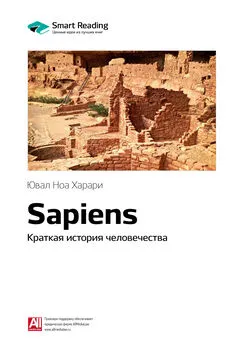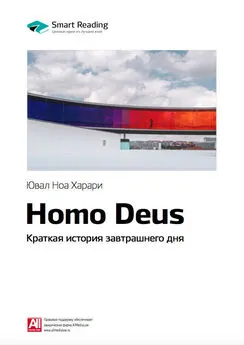Юваль Харари - Homo Deus. Краткая история будущего
- Название:Homo Deus. Краткая история будущего
- Автор:
- Жанр:
- Издательство:Литагент Синдбад
- Год:неизвестен
- ISBN:978-5-906837-92-9
- Рейтинг:
- Избранное:Добавить в избранное
-
Отзывы:
-
Ваша оценка:
Юваль Харари - Homo Deus. Краткая история будущего краткое содержание
Что произойдет, когда Google и Facebook будут лучше, чем мы сами, знать наши вкусы, личные симпатии и политические предпочтения? Что будут делать миллиарды людей, вытесненных компьютерами с рынка труда и образовавших новый, бесполезный класс? Как воспримут религии генную инженерию? Каковы будут последствия перехода полномочий и компетенций от живых людей к сетевым алгоритмам? Что должен предпринять человек, чтобы защитить планету от своей же разрушительной силы?..
Главное сейчас, полагает Харари, – осознать, что мы находимся на перепутье, и понять, куда ведут пути, простирающиеся перед нами. Мы не в силах остановить ход истории, но можем выбрать направление движения.
Homo Deus. Краткая история будущего - читать онлайн бесплатно ознакомительный отрывок
Интервал:
Закладка:
73
Jerome H. Barkow, Leda Cosmides and John Tooby, ed., Te Adapted Mind: Evolutionary Psychology and the Generation of Culture (Oxford: Oxford University Press, 1992); Richard W. Bloom and Nancy Dess, ed., Evolutionary Psychology and Violence: A Primer for Policymakers and Public Policy Advocates (Westport: Praeger, 2003); Charles Crawford and Catherine Salmon, ed., Evolutionary Psychology, Public Policy and Personal Decisions (New Jersey: Lawrence Erlbaum Associates, 2008); Patrick McNamara and David Trumbull, An Evolutionary Psychology of Leader – Follower Relations (New York: Nova Science, 2007); Joseph P. Forgas, Martie G. Haselton and William von Hippel, ed., Evolution and the Social Mind: Evolutionary Psychology and Social Cognition (New York: Psychology Press, 2011).
74
S. Held, M. Mendl, C. Devereux and R. W. Byrne, ‘Social tactics of pigs in a competitive foraging the task: the “informed forager” paradigm’, Animal Behaviour 59:3 (2000), 569–576; S. Held, M. Mendl, C. Devereux and R. W. Byrne, ‘Studies in social cognition: from primates to pigs’, Animal Welfare 10 (2001), s209–217; H. B. Graves, ‘Behavior and ecology of wild and feral swine (Sus scrofa)’, Journal of Animal Science 58:2 (1984), 482–492; A. Stolba and D. G. M. Wood-Gush, ‘Te behaviour of pigs in a semi-natural environment’, Animal Production 48:2 (1989), 419–425; M. Spinka, ‘Behaviour in pigs’, in P. Jensen (ed.), Te Ethology of Domestic Animals , 2 ndedition (Wallingford, UK: CAB International, 2009), 177–191; P. Jensen and D. G. M. Wood-Gush, ‘Social interactions in a group of free-ranging sows’, Applied Animal Behaviour Science 12 (1984), 327–337; E. T. Gieling, R. E. Nordquist and F. J. van der Staay, ‘Assessing learning and memory in pigs’, Animal Cognition 14 (2011), 151–173.
75
I. Horrell and J. Hodgson, ‘Te bases of sow-piglet identifcation. 2. Cues used by piglets to identify their dam and home pen’, Applied Animal Behavior Science , 33 (1992), 329–343; D. M. Weary and D. Fraser, ‘Calling by domestic piglets: Reliable signals of need?’, Animal Behaviour 50:4 (1995), 1047–1055; H. H. Kristensen et al., ‘Te use of olfactory and other cues for social recognition by juvenile pigs’, Applied Animal Behaviour Science 72 (2001), 321–333.
76
M. Helf, ‘Pig video arcades critique life in the pen’, Wired , 6 June 1997, http://archive.wired.com/science/discoveries/news/1997/06/4302 retrieved 27 January 2016.
77
Humane Society of the United States, ‘A n HSUS Report: Welfare Issues with Gestation Crates for Pregnant Sows’, February 2013, http://www.humanesociety.org/assets/pdfs/farm/HSUS-Report-on-Gestation-Crates-for-Pregnant-Sows.pdf, retrieved 27 January 2016.
78
Turnbull and Solms, Brain and the Inner World , 90–92.
79
David Harel, Algorithmics: Te Spirit of Computers , 3rd edn [in Hebrew] (Tel Aviv: Open University of Israel, 2001), 4–6; David Berlinski, Te Advent of the Algorithm: Te 300-Year Journey from an Idea to the Computer (San Diego: Harcourt, 2000); Hartley Rogers Jr, Teory of Recursive Functions and Efective Computability, 3rd edn (Cambridge, MA and London: MIT Press, 1992), 1–5; Andreas Blass and Yuri Gurevich, ‘Algorithms: A Quest for Absolute Defnitions’, Bulletin of European Association for Teoretical Computer Science 81 (2003), 195–225; Donald E. Knuth, Te Art of Computer Programming , 2nd edn (New Jersey: Addison-Wesley Publishing Company, 1973).
80
Daniel Kahneman, Tinking, Fast and Slow (New York: Farrar, Straus & Giroux, 2011); Dan Ariely, Predictably Irrational (New York: Harper, 2009).
81
Justin Gregg, Are Dolphins Really Smart? The Mammal Behind the Myth (Oxford: Oxford University Press, 2013), 81–87; Jaak Panksepp, ‘Afective Consciousness: Core Emotional Feelings in Animals and Humans’, Consciousness and Cognition 14:1 (2005), 30–80.
82
A. S. Fleming, D. H. O’Day and G. W. Kraemer, ‘Neurobiology of Mother – Infant Interactions: Experience and Central Nervous System Plasticity Across Development and Generations’, Neuroscience and Biobehavioral Reviews 23:5 (1999), 673–685; K. D. Broad, J. P. Curley and E. B. Keverne, ‘Mother – Infant Bonding and the Evolution of Mammalian Relationship’, Philosophical Transactions of the Royal Society B 361:1476 (2006), 2199–2214; Kazutaka Mogi, Miho Nagasawa and Takefumi Kikusui, ‘Developmental Consequences and Biological Signifcance of Mother-Infant Bonding’, Progress in Neuro-Psychopharmacology and Biological Psychiatry 35:5 (2011), 1232–1241; Shota Okabe et al., ‘Te Importance of Mother– Infant Communication for Social Bond Formation in Mammals’, Animal Science Journal 83:6 (2012), 446–452.
83
Бихевиоризм (от англ. behavior – поведение) – одна из самых распространенных теорий в западной психологии первой половины XX века. Ее основатель – американский психолог Джон Бродес Уотсон (1878–1958).
84
Jean O’Malley Halley, Boundaries of Touch: Parenting and Adult– Child Intimacy (Urbana: University of Illinois Press, 2007), 50–51; Ann Taylor Allen, Feminism and Motherhood in Western Europe, 1890–1970: Te Maternal Dilemma (New York: Palgrave Macmillan, 2005), 190.
85
Lucille C. Birnbaum, ‘Behaviorism in the 1920s’, American Quarterly 7:1 (1955), 18.
86
US Department of Labor (1929), ‘Infant Care’, Washington: United States Government Printing Ofce, http://www.mchlibrary.info/history/chbu/3121–1929.PDF.
87
Harry Harlow and Robert Zimmermann, ‘Afectional Responses in the Infant Monkey’, Science 130:3373 (1959), 421–432; Harry Harlow, ‘Te Nature of Love’, American Psychologist 13 (1958), 673–685; Laurens D. Young et al., ‘Early Stress and Later Response to Sepаration in Rhesus Monkeys’, American Journal of Psychiatry 130:4 (1973), 400–405; K. D. Broad, J. P. Curley and E. B. Keverne, ‘Mother – Infant Bonding and the Evolution of Mammalian Social Relationships’, Philosophical Transactions of the Royal Soceity B 361:1476(2006), 2199–2214; Florent Pittet et al., ‘Efects of Maternal Experience on Fearfulness and Maternal Behavior in a Precocial Bird’, Animal Behavior 85:4(2013), 797–805.
88
Jacques Cauvin, Te Birth of the Gods and the Origins of Agriculture (Cambridge: Cambridge University Press, 2000); Tim Ingord, ‘From Trust to Domination: An Alternative History of Human – Animals Relations’, in Animals and Human Society: Changing Perspectives , ed. Aubrey Manning and James Serpell (New York: Routledge, 2002), 1–22; Roberta Kalechofsky, ‘Hierarchy, Kinship and Responsibility’, in A Communion of Subjects: Animals in Religion, Science and Ethics , ed. Kimberley Patton and Paul Waldau (New York: Columbia University Press, 2006), 91–102; Nerissa Russell, Social Zooarchaeology: Humans and Animals in Prehistory (Cambridge: Cambridge University Press, 2012), 207–258; Margo DeMello, Animals and Society: An Introduction to Human – Animal Studies (New York: University of Columbia Press, 2012).
89
Olivia Lang, ‘Hindu Sacrifce of 250,000 Animals Begins’, Guardian , 24 November 2009, accessed 21 December 2014,http://www.theguardian.com/world/2009/nov/24/hindu-sacrifce-gadhimai-festival-nepal.
90
Перевод с аккадского И. М. Дьяконова.
91
Benjamin R. Foster, ed., Te Epic of Gilgamesh (New York, London: W. W. Norton, 2001), 90.
92
Noah J. Cohen, Tsa’ar Ba’ale Hayim: Prevention of Cruelty to Animals: Its Bases, Development and Legislation in Hebrew Literature (Jerusalem, New York: Feldheim Publishers, 1976); Roberta Kalechofsky, Judaism and Animal Rights: Classical and Contemporary Responses (Marblehead: Micah Publications, 1992); Dan Cohen-Sherbok, ‘Hope for the Animal Kingdom: A Jewish Vision’, in A Communion of Subjects: Animals in Religion, Science and Ethics , ed. Kimberley Patton and Paul Waldau (New York: Columbia University Press, 2006), 81–90; Ze’ev Levi, ‘Ethical Issues of Animal Welfare in Jewish Tought’, in Judaism and Environmental Ethics: A Reader , ed. Martin D. Yafe (Plymouth: Lexington, 2001), 321–332; Norm Phelps, Te Dominion of Love: Animal Rights According to the Bible (New York: Lantern Books, 2002); Dovid Sears, Te Vision of Eden: Animal Welfare and Vegetarianism in Jewish Law Mysticism (Spring Valley: Orot, 2003); Nosson Slifin, Man and Beast: Our Relationships with Animals in Jewish Law and Tought (New York: Lambda, 2006).
93
Talmud Bavli, Bava Metzia, 85:71.
94
Christopher Chapple, Nonviolence to Animals, Earth and Self in Asian Tr a dit i on s (New York: State University of New York Press, 1993); Panchor Prime, Hinduism and Ecology: Seeds of Truth (London: Cassell, 1992); Christopher Key Chapple, ‘Te Living Cosmos of Jainism: A Traditional
Science Grounded in Environmental Ethics’, Daedalus 130:4 (2001), 207–224; Norm Phelps, The Great Compassion: Buddhism and Animal Rights (New York: Lantern Books, 2004); Damien Keown, Buddhist Ethics: A Very Short Introduction (Oxford: Oxford University Press, 2005), ch. 3; Kimberley Patton and Paul Waldau, ed., A Communion of Subjects: Animals in Religion, Science and Ethics (New York: Columbia University Press, 2006), esp. 179–250; Pragati Sahni, Environmental Ethics in Buddhism: A Virtues Approach (New York: Routledge, 2008); Lisa Kemmerer and Anthony J. Nocella II, ed., Call to Compassion: Refections on Animal Advocacy from the World’s Religions (New York: Lantern, 2011), esp. 15–103; Lisa Kemmerer, Animals and World Religions (Oxford: Oxford University Press, 2012), esp. 56–126; Irina Aristarkhova, ‘Tou Shall Not Harm All Living Beings: Feminism, Jainism and Animals’, Hypatia 27:3 (2012): 636–650; Eva de Clercq, ‘Karman and Compassion: Animals in the Jain Universal History’, Religions of South Asia 7 (2013): 141–157.
95
Naveh, ‘Changes in the Perception of Animals and Plants’, 11.
96
Понятие было популяризировано американским документальным телесериалом о природе уникальности человека («Человеческая искра», 2010), где ведущим выступает актер Алан Алда.
97
Выражение пошло от названия книги «Сила есть право, или Выживание наиболее приспособленных», выпущенной неизвестным автором под псевдонимом Рагнар Редбёрд в 1896 году.
Читать дальшеИнтервал:
Закладка:
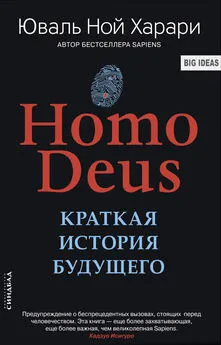
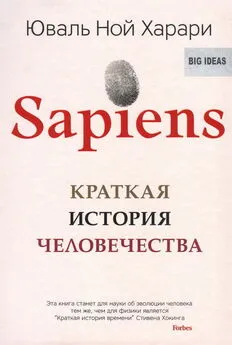
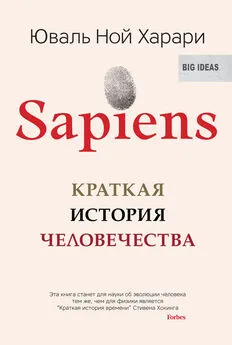
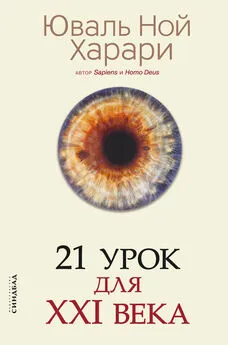
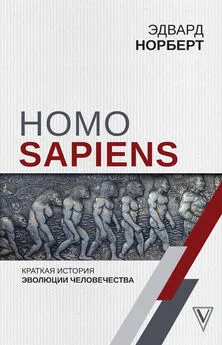
![Жак Аттали - Краткая история будущего [Мир в ближайшие 50 лет]](/books/1076384/zhak-attali-kratkaya-istoriya-buduchego-mir-v-blizhajsh.webp)
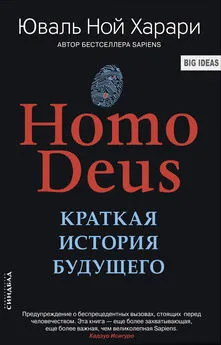
![Юваль Ной Харари - Sapiens. Краткая история человечества [litres]](/books/1102059/yuval-noj-harari-sapiens-kratkaya-istoriya-cheloveche.webp)
